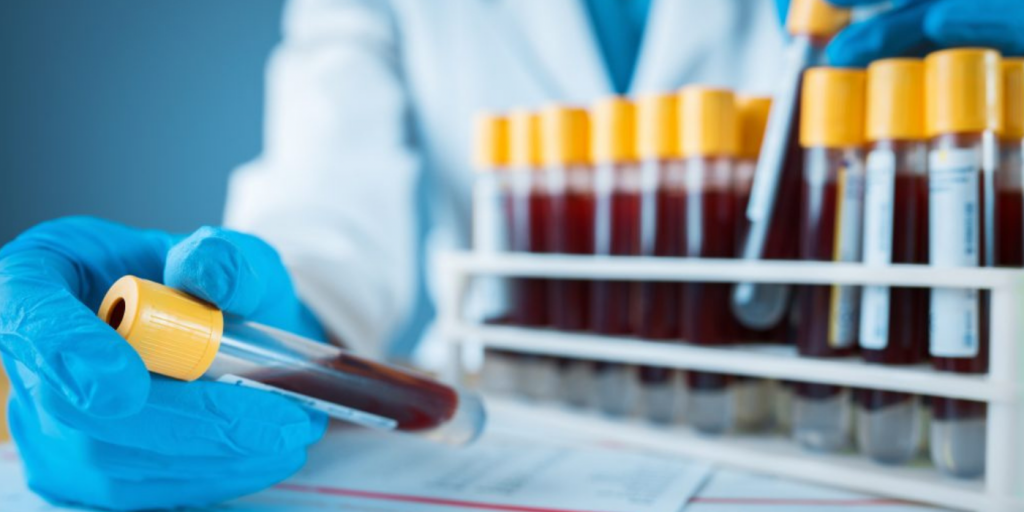‘The long tail of COVID-19’ – researchers investigate biomarkers for Long Covid
| 24 February, 2021 | Wendy Heywood |
|

|

In the wake of the initial COVID-19 crisis, some patients continue to be affected by long-term symptoms and effects. As the ‘next chapter’ of the COVID-19 pandemic, Wendy Heywood and her team at the UCL Great Ormond Street Institute of Child Health (London) have been investigating potential biomarkers for Long Covid in blood samples.
I am the Senior Research Associate working in the field of rare diseases at the UCL Great Ormond Street Institute of Child Health in London and my work is almost exclusively translational medical research. My team also works in biomarker research and test development using mass spectrometry in childhood diseases, which also includes neurology, nephrology and cardiology. Therefore, it was through my group’s expertise gained through developing new and better tests for rare diseases that I was tasked with developing new tests for SARS-CoV-2.
Applying established techniques to investigate biomarkers for Long Covid
We have been working on COVID-19 research throughout the pandemic and have collaborations with fantastic clinicians who all volunteered to be on the front line in this pandemic. Thus, we also volunteered our services to the NHS.
Long Covid is the next chapter in this pandemic. We have the means to study it at the molecular level in blood using methods we have already developed in previous biomarker research projects where inflammation is a key feature, such as Parkinson’s and Alzheimer’s disease. We use targeted proteomics – a technique that can be used on a conventional mass spectrometer, typically used in hospital labs. Using this technique, you can accurately measure multiple proteins using signature peptides derived from inflammatory proteins in serum. This panel was devised for previous studies in diseases with inflammation as a key component such as myocarditis, Parkinson’s and Alzheimer’s disease. Working with our clinical immunology colleagues at Great Ormond Street, we were interested to see if there was a residual inflammation profile in some of their healthcare workers who had tested positive for COVID-19 antibodies, so we applied our multiplex panel to a small cohort.
Understanding the inflammatory response post-COVID-19 infection
Samples were taken 40–60 days post infection from people with only mild or asymptomatic COVID-19 infection. From a panel of 96 proteins associated with inflammation, we observed 6 proteins were altered. One protein was an indirect marker for white cell activity and other proteins had anti-inflammatory functions. The most significantly affected protein was a stress response antioxidant protein from the mitochondria PRDX3. We conclude that even in mild and asymptomatic cases and even 40–60 days post infection, there is a continued anti-inflammatory and cellular stress response ongoing in people infected with COVID-19.
Unlike looking at conventional inflammatory markers such as cytokines, we can see other inflammatory pathways as well as the related stress response. This data gives us an insight into how the immune system is behaving weeks after infection. This could be applicable to understanding what may be going on in people affected with Long Covid.
We are currently applying this method to multi-centre larger cohorts with clinical data and machine learning to tease out specific features of post-COVID-19 infection. As the panel can be easily updated with new proteins associated or hypothesised to be involved with Long Covid, we have since amended it to keep it dynamic with the fast-paced research in COVID-19 infection.
Rapid publication in a time of COVID-19
At this crucial time, it is important that all relevant information regarding this disease is released into the public domain as soon as possible. Therefore, we thought it imperative this information was released quickly to the scientific and medical research community and F1000Research allowed us to do that.
Discover more about biomarkers for Long Covid – Read Heywood’s full article: ‘The long tail of Covid-19’ – The detection of a prolonged inflammatory response after a SARS-CoV-2 infection in asymptomatic and mildly affected patients

|



User comments must be in English, comprehensible and relevant to the post under discussion. We reserve the right to remove any comments that we consider to be inappropriate, offensive or otherwise in breach of the User Comment Terms and Conditions. Commenters must not use a comment for personal attacks.
Click here to post comment and indicate that you accept the Commenting Terms and Conditions.